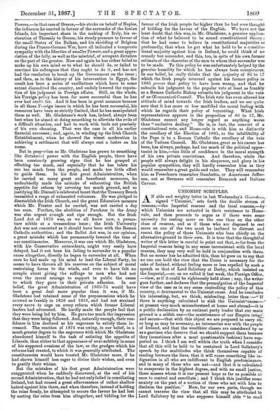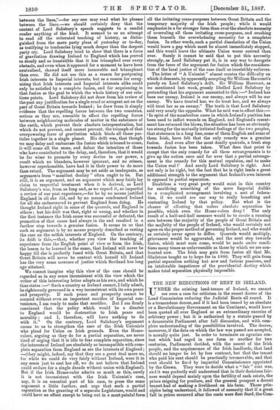UNIONIST SCRUPLES.
AN able and weighty letter in last Wednesday's Guardian, signed " Unionist," sets forth the double stream of reasons,—the Imperial reasons and the local reasone,—by which Unionists are actuated in their resistance to Home-- rule, and then proceeds to argue as if there were some necessity for resting more on the one than on the other class of reasons, and as if those who are disposed to rest more on one of the two must be inclined to distrust and resent the policy of those Unionists who lean chiefly on the alternative ground to their own. It is true that the thoughtful writer of this letter is careful to point out that, so far from the Imperial reasons being in any sense inconsistent with the local reasons, they may very well be held in conjunction with them. But no sooner has he admitted this, than he goes on to say that no one can bold the view that the Union is necessary for the sake of Ireland, without feeling more or less repelled by such a speech as that of Lord Salisbury at Derby, which insisted en the Imperial,—or, as we called it last week, the Foreign Office, —view, as if it could be righteously held alone ; nay, the writer goes further, and declares that the promulgation of the Imperial view of the case as in any sense controlling the policy of this . country, is detrimental to the Unionist cause. And he concludes his interesting, but, we think, misleading, letter thus :—" If there is anything calculated to sink the Unionistocause-0 at present very much misunderstood at home and abroad—it is a public declaration by an eminent party leader that our main ground is a selfish one—the maintenance of our Empire ints and secure—that with this object we are prepared to carry on, so long as may be necessary, an internecine war with the people of Ireland, and that the wealthier classes are considered by us as a garrison who deserve that we should support them because they (sometimes after a most questionable fashion) have sup- ported us. I think I am well within the truth when I consider that all this will be held to be contained in Lord Salisbury's speech by the multitudes who think themselves capable of reading between the lines, that it will rouse something like in- dignation in all who are indifferent to English predominance, and in many of those who are not—and that it is calculated- to exasperate in the highest degree, and with no small justice, those masses whom it is our present hope as far as possible at- once to control and conciliate ; and I think this justifies some anxiety on the part of a section of those who act with him to disclaim the position." Now, for our own parte, though we cannot traverse the view that all this may be attributed to Lord Salisbury by one who supposes himself able " to read between the lines,"—for• any one may read what he pleases between the lines,—we should certainly deny that the context of Lord Salisbury's speech suggests to a candid reader anything of the kind. It seemed to us an attempt to read off the reiterated teaching of history, as distin- guished from the mere party pleas of yesterday or to-day, as testifying to tendencies lying much deeper than the deepest party cry. Lord Salisbury tried to show that there is a force of gravitation drawing Ireland to England which has proved so steady and so irresistible that it has triumphed over every obstacle, and even when it appeared for a moment to have been neutralised, showed itself more inexorable and triumphant than ever. He did not use this as a reason for postponing Irish interests to Imperial interests, but as a reason for recog- nising that Irish interests and Imperial interests alike could only be satisfied by a complete fusion, and for acquiescing in that fusion as the goal to which the whole history of our rela- tions points. Lord Salisbury did not draw from his review of the past any justification for a single cruel or arrogant act on the part of Great Britain towards Ireland ; he drew from it simply evidence that the repelling forces between the two countries, serious as they are, resemble in effect the repelling forces between neighbouring molecules of matter in the substance of the earth, which prevent their absolute interpenetration, but which do not prevent, and cannot prevent, the triumph of that overpowering force of gravitation which binds all those par- ticles together in a single planet. His drift was, that though we may delay and embarrass the fusion which is bound to come, it.will come all the same, and defeat the intention of those who have contributed to the delay, and, therefore, that it would be far wiser to promote by every device in our power, a result which no blunders, however ignorant, and no crimes, however reprehensible, have had it in their power to do more than retard. The argument may be set aside as inadequate, as arguments from "manifest destiny" often ought to be. But still, it is an argument, and an argument which may fairly lay claim to respectful treatment when it is derived, as Lord Salisbury's was, from so long and, as we regard it, so impartial a review of our past experience,—for he by no means justified England in all she did, and by no means condemned Ireland for all she endeavoured to prevent England from doing. He thought Ireland right in some of the quarrels, and England in others ; but his drift was that, right or wrong, and whether in the first instance the Irish cause was successful or defeated, the promotion of that cause had always in the end resulted in a further step towards a genuine fusion. It seems to us that such an argument is by no means properly described as resting the case on the selfish interests of England. On the contrary, its drift is this,—that, whether you view the teaching of experience from the English point of view or from the Irish, the lesson to be learned is the same, that Ireland will never be happy till she is perfectly fused with Great Britain, and that Great Britain will never be content with herself till Ireland has the very same measure of justice which Scotland has long ago attained. We cannot imagine why this view of the case should be regarded as in any sense inconsistent with the view which the writer of this interesting letter adopts as his own, and which he thus states :—" Such a country as Ireland cannot, I fully admit, be righteously governed in a way inconsistent with its own peace and prosperity. If such peace and prosperity cannot be secured without even an important sacrifice of Imperial con- venience, I am ready to make that sacrifice. But I am firmly convinced that the policy which would be a disaster to England would be destruction to Irish peace and morality ; and I, therefore, will have nothing to do with it." On the contrary, Lord Salisbury's argument seems to us to strengthen the case of the Irish Unionists who plead for Union on Irish grounds. Even the Home- rulers, arguing as they do for a partial separation, are never tired of urging that it is idle to fear complete separation, since the interests of Ireland are absolutely as incompatible with com- plete separation from England as are the interests of England ; —(they might, indeed, say that they are a great deal more so, for while we could do very fairly without Ireland, were it in any sense just to cast her off, we do not believe that Ireland could endure for a single decade without union with England). But if the Irish Home-ruler admits as much as this, surely it is not inconsistent with the Irish Unionist's case, nay, it is an essential part of his case, to press the same argument a little farther, and• urge that such a partial separation as the granting of a separate Legislature, would and could have no effect except to bring out in a most painful form
all the irritating cross-purposes between Great Britain and the temporary majority of the Irish people ; while it would emphasise in a far stronger form than ever the absolute necessity of overruling all these irritating cross-purposes, and crushing them beneath the overwhelming necessity for a completer fusion. In other words, such a partial dissolution of the Union would leave a gap which must be almost immediately stopped, and this would leave the ultimate Union worse scarred than ever. Surely it cannot be said that to put this necessity strongly, as Lord Salisbury put it, is in any way to derogate from the force of the argument for fusion which the considera- tion of the local justice of the case itself so irresistibly enforces. The letter of " A Unionist" almost creates the difficulty on which it descants, by apparently accepting Sir William Hatcourt's parody on Lord Salisbury's drift. Sir William Harcourt, as we mentioned last week, grossly libelled Lord Salisbury by pretending that his argument amounted to this :—" Ireland has been our enemy, Ireland is our enemy, and always will be our enemy. We have treated her, we do treat her, and we always will treat her as an enemy." The truth is that Lord Salisbury said very nearly the opposite. What he said was in effect this In spite of the numberless cases in which Ireland's position has been used to inflict wounds on England, and England's resent- ment has returned the blows, the situation has been so obviously too strong for the mutually irritated feelings of the two peoples, that statesmen in a long line, some of them English and some of them Irish, have felt that the only remedy was a genuine fusion. And even after the moat deadly quarrels, a fresh step towards fusion has been taken. What does that point to except that the only remedy for all these estrangements is to give up the notion once and for ever that a partial estrange- ment is the remedy for this mutual repulsion, and to make the Union real ?' And surely Lord Salisbury is right. And not only is he right, but the fact that he is right lends a great additional strength to the argument that Ireland's own interest is opposed to partial separation.
Doubtless a very great party would exist in this country for sacrificing something of the mere Imperial dislike to a complicated arrangement involving a sort of federa- tion, if we could see our way to really benefiting and
contenting Ireland by that policy. But what is the chance of effecting that unless absolute separation be possible, which even the Home-rulers deny ? The only result of a half-and-half measure would be to create a running sore between the majority of the people of Great Britain and the majority of the people of Ireland, who would certainly not agree on the proper method of governing Ireland, and who would as certainly never agree to differ. Quarrels would multiply, grievances would be aggravated, and the next step towards fusion, which must soon come, would be made under condi- tions many times as unfavourable as those by which we are con- fronted now. The Irish may gain from fusion all that Mr. Gladstone taught us to hope for in 1880. They will gain from partial separation nothing but new and furious passions, and an intolerable impatience of the providential destiny which makes total separation physically impossible.







































 Previous page
Previous page